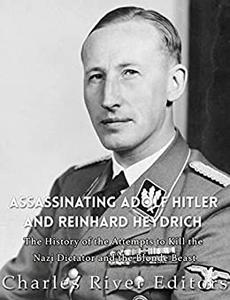
Assassinating Adolf Hitler and Reinhard Heydrich: The History of the Attempts to Kill the Nazi Dictator and the Blond Beast by Charles River Editors
English | August 11, 2016 | ISBN: 1537008323 | 130 pages | EPUB | 3.13 Mb
*Includes pictures *Includes accounts detailing various attempts to kill Hitler and the assassination of Heydrich *Includes online resources and a bibliography for further reading Like other totalitarian regimes, the leader of the Nazis kept an iron grip on power in part by making sure nobody else could attain too much of it, leading to purges of high-ranking officials in the Nazi party. Of these purges, the most notorious was the Night of the Long Knives, a purge in the summer of 1934 that came about when Hitler ordered the surprise executions of several dozen leaders of the SA. Nonetheless, for the most part Hitler enjoyed great popularity among both the members of the Wehrmacht and ordinary Germans during his rule over the Third Reich between 1934 and 1945. To many, he appeared to be the spirit of a revived, powerful Germany, shaking off the hardship and humiliation imprudently inflicted by the victorious western Allies at the end of World War I. His strangely magnetic, ranting speeches struck a chord with millions, creating iron loyalty in many of those who followed the commands of his dictatorship. From the very beginning, however, others held a different view of the newly constituted Third Reich's Fuhrer. Though the concept of tyrannicide remained so foreign to German culture that the word only appeared in the national language after World War II, as the war progressed and Germany's fortunes faltered, more individuals and groups Descriptionted the death of Hitler. Through it all, Hitler eluded many of the attempts on his life without ever realizing his risk. Most Descriptionters escaped undetected, baffled by the randomness and secretive nature of Hitler's movements. The Fuhrer frequently canceled prearranged engagements, arrived at other locations with only a few minutes' advance notice, used different trains than originally planned, and generally proved constantly unpredictable. When Hitler traveled by air, he not only brought a detachment of fanatical SS guards, but also highly trusted personal physicians and cooks, and his own personal car, the latter armored and already thoroughly checked for sabotage and booby traps. Beyond all his precautions, the Fuhrer sometimes almost appeared protected by incredible - or uncanny - luck. Despite the enmity of the world and the increasingly violent opposition of his own officers, the Third Reich's leader lived until he chose to die, as though destined by some dark fate to perish only by his own hand. The assassination of Reinhard Heydrich stands out as one of the war's most remarkable secret operations. "The man with the iron heart," as Adolf Hitler dubbed him, made a fitting target for the dramatic events which unfolded in Prague on May 27th, 1942. According to testimony by the historian Michael Freund, "He is one of the greatest criminal figures of the Third Reich. Nowhere in the histories of the Third Reich has [Heydrich] been awarded his rightful place. He is a man of outstanding significance, a criminal mind of Luciferic grandeur." (Dederichs, 2009, 17). During the early stages of the war, the Reich Protector often walked the streets of Prague alone or with just one or two escorts, and he also favored an open-topped Mercedes 320-C convertible, which left him fully exposed to snipers, bomb throwers, and the like. Though he was ordered by the Fuhrer to install armored plates inside the seat backs to limit the effect of grenades hurled into the interior of his vehicle, these armor pieces remained idle in the castle garage on the date of Heydrich's assassination. By contrast, Heydrich found time to have expensive horsehair upholstery installed in the touring car, providing a springy, comfortable ride. That would be all the good fortune a British-trained team of Czech assassins would need.
Links are Interchangeable - No Password - Single Extraction



